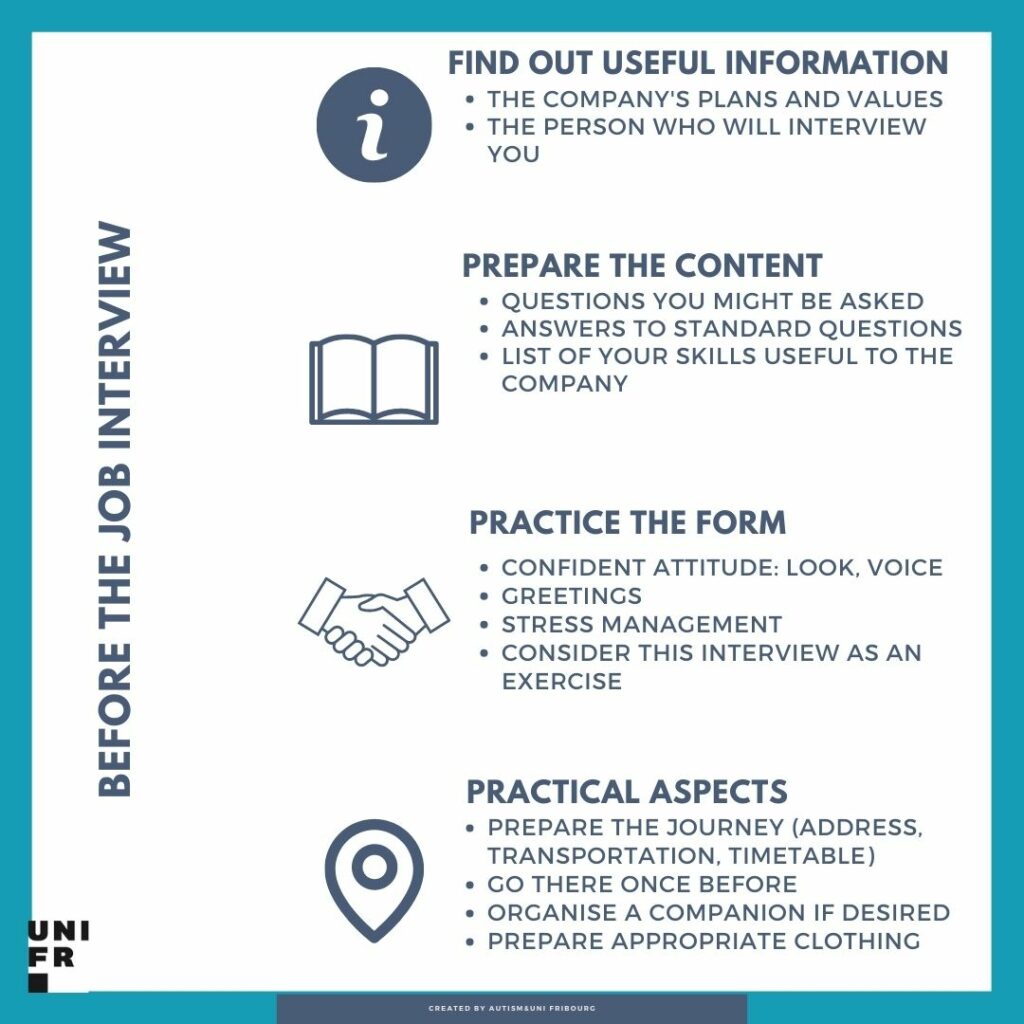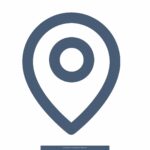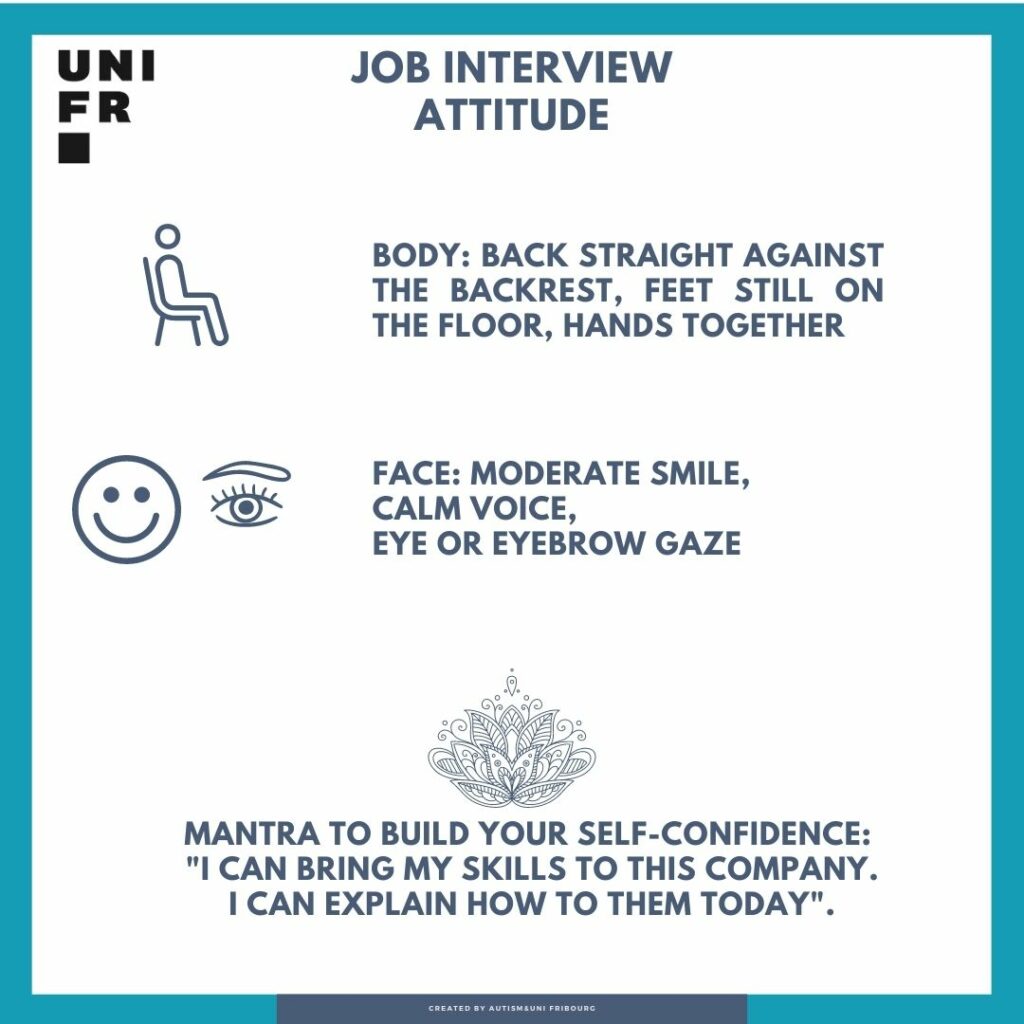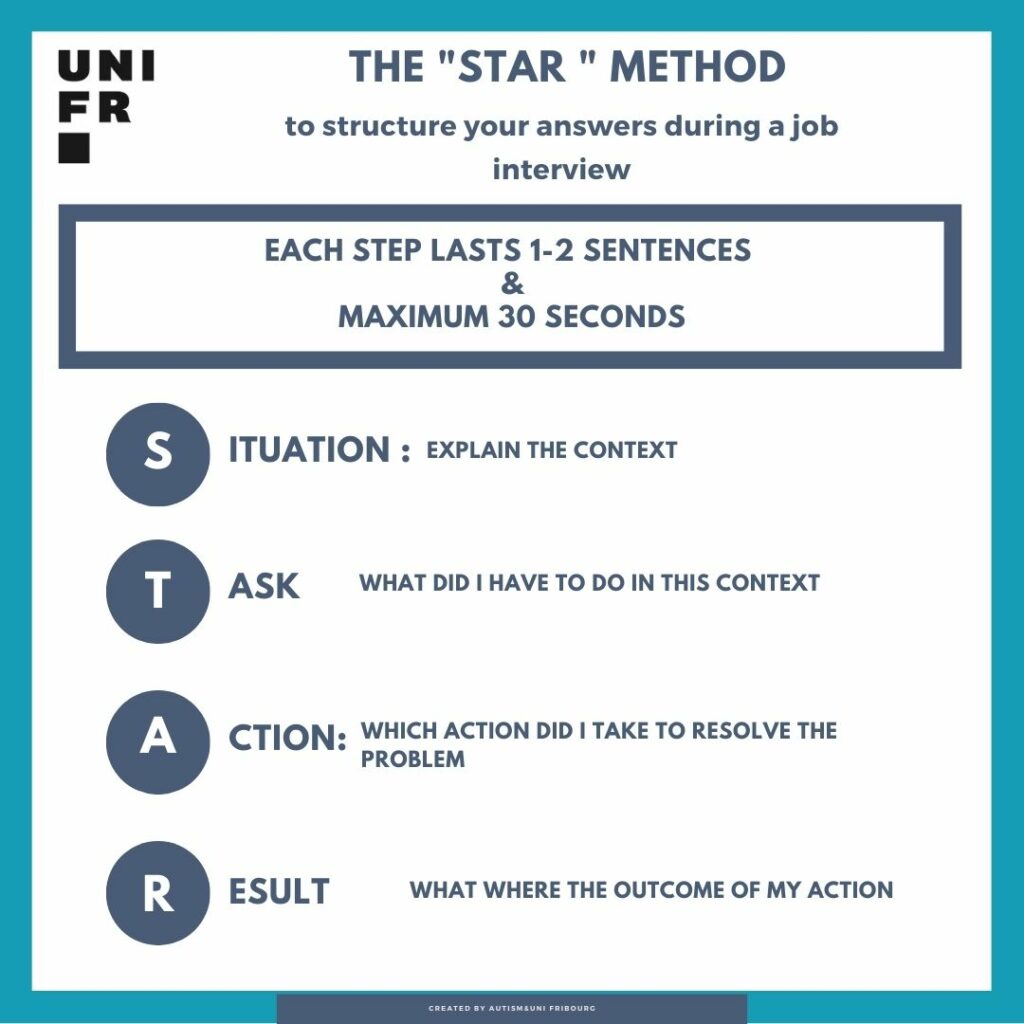This article explains the key points for a successful job interview.
Context
After university, a successful job interview increases the chances of entering the labour market during or after university to live as independent a life as possible.
What does that have to do with me?
The job interview is a difficult exercise for everyone. The idea of introducing oneself to an unknown interviewer about an unknown future job is a major source of stress.
The employability rate of adults with autism is on average lower than that of their neurotypical peers. Young adults on the autism spectrum describe frequent difficulties in self-esteem, communication, social interaction and reciprocity, and in understanding and practising non-verbal behaviours.
During a job interview, many factors can influence the employer’s decision to hire you or not. Some aspects are immutable, others can be trained:
- Personality plays a role in the job interview. It cannot be changed. The first step is therefore to get to know yourself in order to remain authentic. Take the time to identify your qualities. For example, if you are precise, discreet, conscientious, reliable, or if you have a talent for seeing details, these are qualities that are highly valued on the job market. Being aware of them will allow you to name them in order to emphasise them.
- Social skills are important in a job interview. Social skills can be trained. They are important because a mutual understanding can influence whether a person is hired. This influence can sometimes be greater than the actual qualifications. You can also read the article on transferable skills.
- Proper verbal expression (speaking intelligibly, not too slowly and not too quickly, pausing at the right moments) can help make the speech clear and convincing.
- Reassuring non-verbal behaviour can also lead to confidence (posture, eye contact, smiling, hand and head movements).
- Other aspects are important, such as personal interests, values, goals, willingness and state of mind of the candidate at the time of the interview.
What is the next step?
Make a list of your qualities in a professional context in order to better highlight your potential
Practical advice
Before the interview
- Find out about the company beforehand: its projects (past, current, future), its values, its main areas of work.
- If possible, find out about the person who will be interviewing you so that you can prepare targeted questions.
- A job interview can be conducted in different ways: in person, online, video or audio only: familiarise yourself with these methods so that you feel comfortable.
- Anticipate the questions you may be asked so that you have a prepared answer.
- Practice answers to frequently asked questions (see below).
- Practice by filming or recording yourself giving these answers to refine your voice and body language.
- Practise with someone you trust.
- Create a list of your skills and qualities. Target those that might be suitable for the job you are applying for and memorise them in order to mention them during the interview.
- If you are struggling to identify your qualities, ask people close to you for advice.
Practice on your own:
-
-
- Test your body language and eye contact with a mirror.
- Get used to keeping your hands clasped in front of you when standing, and on your lap or clasped when sitting. This will prevent you from moving them and showing your nervousness.
- In front of the mirror, learn to stand up straight with your shoulders raised
- Learn to maintain eye contact. If this is difficult for you, fix a point to look at, such as the top between your conversation partner’s eyebrows.
- Prepare a ready-made sentence to indicate if you do not understand the question being asked.
- Learn how to manage stress, for example:
- With a mental visualisation exercise: imagine the interview as if you were there, perfectly at ease and calm.
- With a breathing routine: breathe in thinking of a positive statement (e.g. “my application is interesting and I could be a great resource for the company because of my qualities”), and relax your neck muscles on the exhale.
- For other techniques the chapter on managing emotions should be useful.
-
Practice with someone you trust:
-
-
-
- Simulate a job interview in the form of a role-play in order to practice eye contact, confident speech and non-verbal communication.
- Practice smiling, shaking hands and introducing yourself.
- Attitude exercise
Because of low self-esteem, job seekers sometimes have a scowling body posture: head down, back hunched, shoulders forward. This posture can create a sense of fear in people who don’t know you. Here is a simple exercise:Ask someone you know to take a picture of you standing and sitting as you are. Print these 2 photos.Ask them to take 2 more photos of the same type, but this time standing tall and proud, chin and eyes up, shoulders back, back straight against the backrest for the sitting position.Compare the photos and see which ones correspond to someone who is confident and able to do the job they have been recruited to do.
-
-
- Check the address, time and exact location of your appointment so that you can prepare the journey with sufficient time.
- Plan how to get to the meeting place: find out about bus/train timetables.
- Make the journey once beforehand to identify the building and reduce anxiety about the novelty.
- If you wish to be accompanied by a relative or friend, anticipate the request to this person. If possible, it is better if this person does not participate in the interview in order to show your future employer that you are independent. But sometimes the presence of a trusted person outside the building can be enough to increase your confidence.
- Prepare the clothes you will wear, make sure they are clean and ironed. Choose an outfit in which you are comfortable and look neat. Depending on the job, chose appropriate clothing (shirt, shoes rather than sneakers).
- Consider the interview as an exercise in learning, even if you are not selected in the end.
The day of the interview
- Allow plenty of time to get ready.
- Remember that your application is very interesting, otherwise you would not have been invited to a job interview.
- Take care of your appearance in order to make a positive first impression in terms of personal hygiene: shower with hair wash, teeth, cut your nails, and do not overdo the perfume or toilet water.
- Arrive on time! You can arrive a little early, but not more than 10 minutes.
- Just before the interview: practice the stress management exercises so that you arrive in the interview room as confident as possible.
- Take a deep breath before you enter and trust yourself.
The first greeting
- On first contact, offer a firm handshake if the covid allows it, accompany this first greeting with a look and a moderate smile that indicates that you are happy to be here.
- Introduce yourself clearly (first and last name).
- Be cordial with everyone you meet.
- When you meet someone for the first time, there may be a few minutes of “small talk”. This is a casual conversation between people to avoid an awkward silence and to get to know each other and create a bond. You will find guidelines for managing this moment in the chapter on small talk.
During the interview
- Keep the posture identified in the photo exercise.
- Maintain regular eye contact with your interviewer (in the eyes or towards the eyebrows), smile moderately, keep your voice calm and steady.
- Keep a confident and interested attitude to show the interviewer that you are the right person for the job.
- Keep your hands together when not speaking, speak calmly and ask questions when you are not sure you have understood.
- When asked questions, try to answer clearly but briefly, without going into detail.
- In your answers, relate your skills to the company’s needs.
- If you are answering a question on a subject you are passionate about, keep it short and don’t go into detail unless explicitly asked.
- Supplement answers to direct questions with a few extras (“yes, I have used this programme during my studies and on a project in my previous job” rather than “yes”).
- If sensitive topics such as religion or politics are discussed, keep a sober attitude and do not enter into controversial debates.
- The following mindset will help you during the interview: “I can bring my skills to this company. I will show them how”.
At the end of the interview
- Show your motivation at the end of the interview with a prepared phrase (e.g. “now that I have a better understanding of the job, I feel even more motivated”).
- Thank your interviewer for having taken the time for you
Answering the questions
The questions you will be asked have different purposes: to find out about your abilities, your experience, your temperament.
If a question surprises you, ask for a moment to think about it (e.g. “that’s a good question, let me think about it for a moment”). Be careful not to overuse this tactic, and don’t wait too long before giving the answer either.
The STAR method allows you to explain your experience by structuring your answers in a precise and concise way. It avoids going on and on about subjects that you are passionate about and that may bore your interviewer. Each stage should be described in 1 to 2 sentences and a maximum of 30 seconds.
- Situation: briefly explain the context
- Task: what task had to be done
- Action: what actions were taken to solve the task
- Result: what was the final result
Frequently asked questions
Here are some questions that come up regularly. Practise answering them
- Can you introduce yourself?
You can mention your general experiences and those specific to the job. Don’t go into detail about things like personal life, where you grew up, who you live with. - What are your qualities?
List your qualities that are useful to the company. Always relate the quality to the skills required for the job. - What are your weaknesses?
The interviewer wants to know if you are aware of your own limitations and if you learn from your mistakes. You should prepare an answer without lying or being too honest! It is better to express your weaknesses in positive terms. For example, instead of saying: “I hate working in a team”, prefer “I am very efficient when I can work independently”. Instead of saying “I lack confidence”, say “I tend to be a perfectionist”. - Why should we hire you rather than someone else?
The answer to this question can be frightening because it can be a form of boasting. On the contrary, you should describe here your values and skills that make you the ideal candidate. You can explain what you like about the company and what motivates you to apply.
Questions to ask yourself
- Do I have all the information I need to get to the meeting place?
- Which of my qualities can match the job?
- Am I trained to introduce myself and answer standard questions?
- Do I feel comfortable in my chosen outfit?
About the author
Edited by Lou Michaud & Nathalie Quartenoud ©
Translated by Nathalie Quartenoud

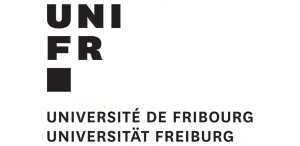
 Back
Back 